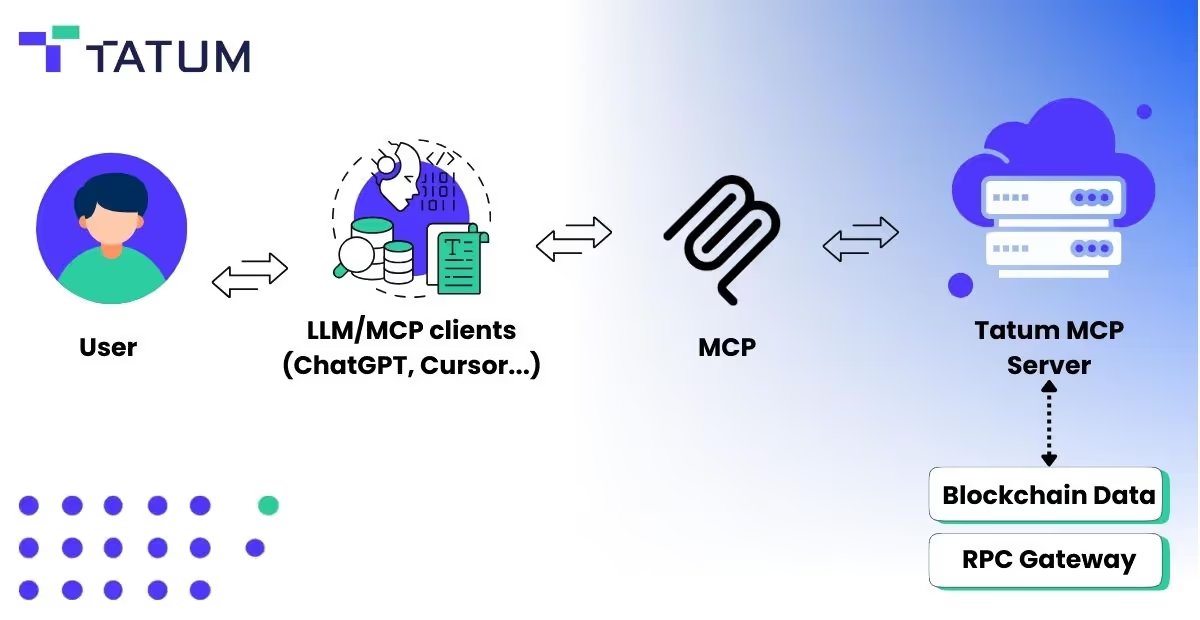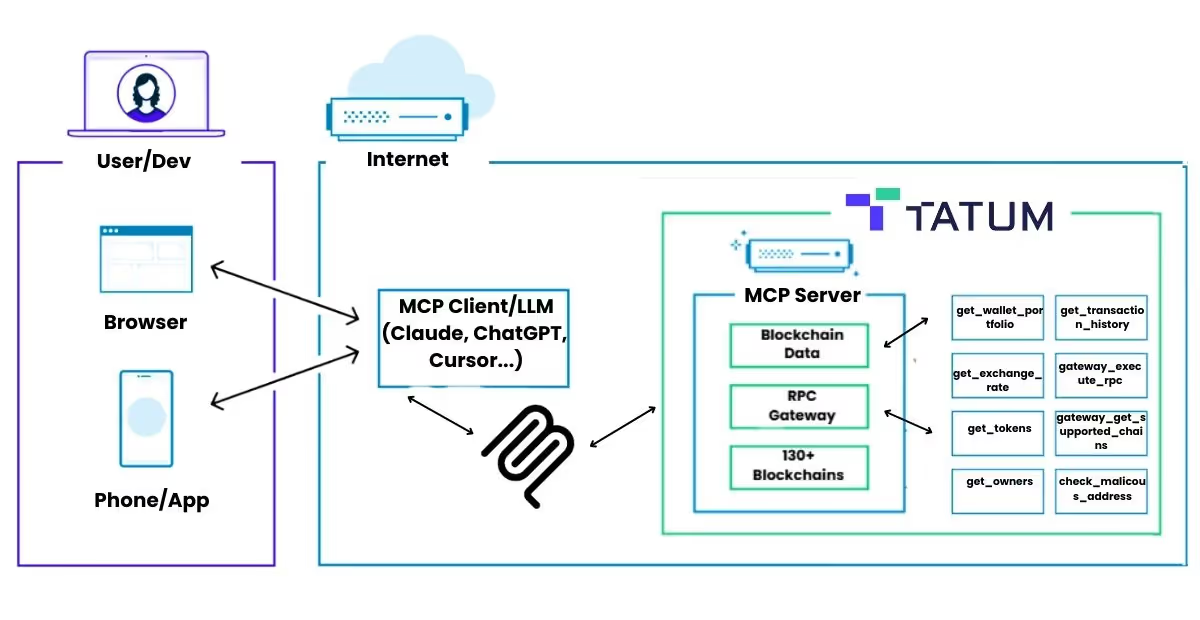Tatum MCP Server: Connect AI Agents to 130+ Blockchains



For years, AI agents have been a bit… isolated. They could think, reason, and spit out answers, but it was all based on whatever they’d already been trained on.
No fresh data. No real-world reach.
The Model Context Protocol (MCP) changes that.
In plain English, the Model Context Protocol (MCP) is an open standard that lets Large Language Models (LLMs) connect to external services through small, modular “servers.” Plug one in and, just like that, your AI gains a whole new skill set without retraining or hacking together messy integrations.
Think of it as a USB port for AI: one simple connection, and suddenly it can pull live market data, hit APIs, run tools… basically, become useful in ways it couldn’t before. Just as APIs powered the Web2 boom, MCP is set to accelerate what’s possible in AI by an order of magnitude.
And here’s the kicker, MCP servers can slot right into tools you might already be using, like Cursor, the AI-powered code editor. That means you can go from “install” to “my AI is pulling live blockchain data” in just a few minutes.
(See our Cursor directory)
Blockchain data is messy in all the ways AI hates. It’s distributed, constantly updating, and comes in dozens of different formats depending on the chain. Historically, if you wanted an AI to “see” what’s happening on-chain, you had to run your own nodes, manage a mess of RPC endpoints, and write chain-specific code.
Now, imagine skipping all that.
An MCP server built for blockchain means you and your AI can ask:
- “What’s the latest transaction for this wallet?”
- “To which address the 3.23 ETH were sent last month?”
- “Show me the portfolio breakdown for this address.”
And it gets an answer, in real time, without you building any of the plumbing. That unlocks a ton of new use cases: portfolio assistants that track assets across chains, DeFi bots that flag liquidity changes, NFT verifiers that check rarity and ownership instantly… you get the idea.
This is where Tatum’s Blockchain MCP Server comes in. It’s a bridge between MCP and over 130 blockchains, EVM and non-EVM, powered by the same infrastructure we use for production-grade RPC and Data APIs.
Once you hook it up, your AI can fetch wallet balances, grab NFT metadata, check token portfolios, monitor malicious addresses, and even fire off raw RPC calls. All the responses come back in a single, consistent format, no matter which chain you’re querying. And because it’s running on Tatum’s global gateway, you get sub-30ms latency and automatic failover out of the box.

You can install globally or just in your local project:
npm install -g @tatumio/blockchain-mcp
npm install @tatumio/blockchain-mcp
Get your free API key instantly from the Tatum Dashboard. Required for all MCP integrations.
Get API Key
| Wire It Up to Your MCP Client | Configuration |
|---|---|
| Add this snippet to your MCP client config: |
{
"mcpServers": {
"tatumio": {
"command": "npx",
"args": [
"@tatumio/blockchain-mcp"
],
"env": {
"TATUM_API_KEY": "YOUR_API_KEY"
}
}
}
}
|
Once connected, your AI has access to a toolkit of blockchain-specific functions. It can fetch NFT metadata, check a wallet’s balance at a specific timestamp, pull a full portfolio, list token holdings, or look up a block by time. It can also hit our RPC gateway to see which chains are supported, run any RPC method, or execute custom calls directly.
Let’s say you’re building an AI-powered crypto portfolio assistant. A user says:
“Check my ETH and USDC balances on Base and list all on-chain events in the last 2 weeks.”
The AI passes that to the Tatum MCP Server, which queries multiple blockchains through Tatum’s APIs, then returns the results. A few seconds later, your AI agent has everything it needs to answer, or even trigger follow-up actions.
| Category | Tool | Description |
|---|---|---|
| Blockchain Data (10 tools) | get_metadata | Fetch NFT/multitoken metadata by address and IDs |
| get_wallet_balance_by_time | Get wallet balance at specific time | |
| get_wallet_portfolio | Get comprehensive wallet portfolio | |
| get_owners | Get owners of NFT/token | |
| check_owner | Check if address owns specific token | |
| get_transaction_history | Get transaction history for address | |
| get_block_by_time | Get block information by timestamp | |
| get_tokens | Get tokens for specific wallet | |
| check_malicous_address | Check if address is malicious | |
| get_exchange_rate | Get real-time exchange rates | |
| RPC Gateway (3 tools) | gateway_get_supported_chains | Get all supported blockchain networks |
| gateway_get_supported_methods | Get supported RPC methods for chain | |
| gateway_execute_rpc | Execute RPC calls on any supported chain |
Getting started is as simple as:
Check our Repo on GitHub.
From there, it’s all about what you build.
The blockchain isn’t just for dApps anymore, now your AI agents can plug straight into it, think about it, and act on it in real time.
Build blockchain apps faster with a unified framework for 60+ blockchain protocols.